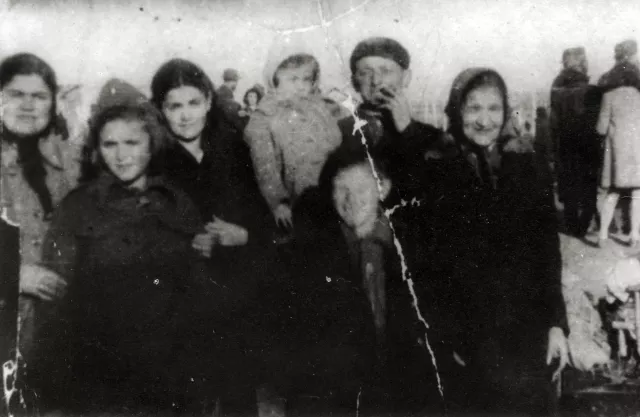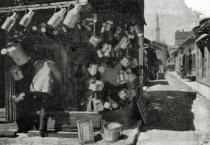Rifka Vostrel with her family
This picture was taken in February 1944 in Italy.
From left to right: my aunt Regina Albahari, nee Atijas, me, my mother, Rosa Altarac, nee Atijas, my sister Lea Pinteric, nee Altarac, in front of her standing is my cousin Albi, Aunt Regina's son, then my father, Leon Altarac, and my maternal grandmother Lea Atijas, nee Abinun.
The picture was taken during a family reunion in Tuturano [near Bari] when they found me.
When Italy capitulated in 1943 my whole family joined the partisans. We went from Split to the village of Zrnovnica on foot along with a large number of people. It was a mix of people, not only Jews but also others who were afraid of the Ustashas and the Germans.
There were also Italian soldiers; since Italy had capitulated, it was better for them to be with us than to be caught by the Germans. At one point, in Dubrava, I separated from my parents and joined a partisan group.
We were passing through the passage called 'Hot Stone' in order to get to Dugopolje. I remember that I even got a small gun which, of course, I didn't know how to use.
We were sneaking into Dugopolje in order to find out who was there, whether it was the Ustashas or the Germans; we didn't know.
We managed to move freely in Dugopolje because nobody was there. In Dugopolje the partisans started to form new groups, and I very much wanted to be included.
In the end they didn't want children to join because we were too young, and so they sent a group of us back to Dubrava. Dubrava was a reception shelter where all the refugees were gathered and organized to be sent to different places.
IWhen I came back, my parents weren't there anymore. They had been evacuated to the village of Srinjine. I just went to visit them and held a lecture for the youth when they opened a youth house there. I told them about my illegal work in Split.
Afterwards I came back to Dubrava where I carried out the duties of a political youth worker. After some time we had to leave Dubrava because it was the time of the 6th offensive. I was evacuated to one side, my parents and Lea to the other.
I, along with my group, went from Dubrava to Jesenice where the boats, which we called trabakuli, were waiting for us [trabacullo is an Italian expression for fishing boat]. They took us to the Island of Brac first and after three months we were transferred to the Island of Vis.
On Brac I was a member of the Kotar Committee for United Youth and took care of the pioneers. The Germans were following us so we had to leave Vis and were evacuated to Italy. All this time I had no idea where my family was.
In Italy many people were waiting for us; actually it was a partisan refugee camp in Bari. There I met a familiar face and she told me that my parents were in Carbonara camp, also in Italy. I wrote them a letter and told them that I was in Bari and that I didn't know where I was going to go.
I was following the refugee groups. As soon as they received the letter my parents joined me in Bari. They came with my aunt Regina and her son Albert, who had met up with my parents in Lastovo when they took a break on their way to Italy.
When my family was finally reunited, we continued our way to El-Shatt in Egypt.












